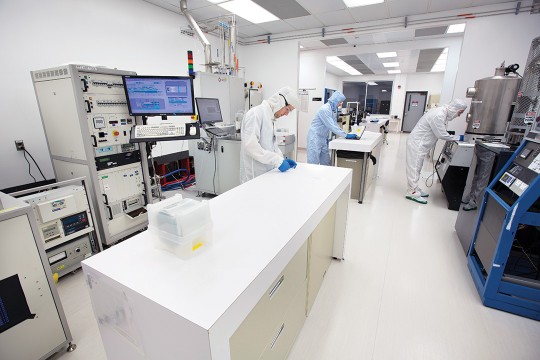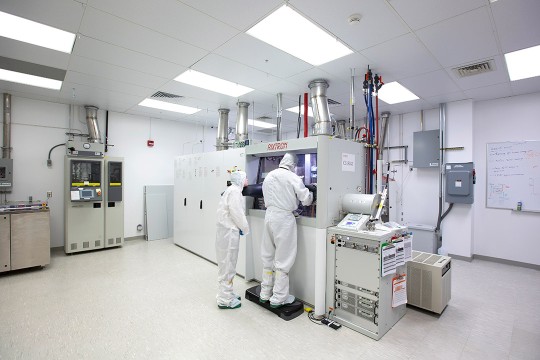News
Microsystems Engineering Ph.D.
-
October 2, 2023

Kate Gleason College of Engineering appoints two new department heads
Brian Landi and Katie McConky have been named department heads of the chemical engineering and industrial and systems engineering programs in the college. Both bring extensive teaching, research, and company experience to the academic leadership positions in the engineering college.
-
August 23, 2023

AIM Photonics bootcamp held at RIT
AIM Photonics hosted several days of training Aug. 15-17 in Photonic Integrated Circuits: Testing and Packaging Boot Camp, including one day at RIT.
-
July 31, 2023

Matt Hartensveld named as a SEMICON West 20 Under 30 future microelectronics industry leader
From building a cleanroom in his family home while he was in high school to becoming an entrepreneur and Ph.D., it is no wonder that RIT alumnus Matt Hartensveld is viewed as a future leader in the microelectronics industry. He was recently named SEMICON West 20 under 30 awardee, given by the organization to recognize the microelectronic industry’s brightest young leaders.
-
May 21, 2023

Rochester Institute of Technology takes its place on international stage at G7 to advance semiconductor development
RIT is one of six U.S. universities named as part of an international partnership to improve competitiveness in computer chip design, development, and manufacturing. Micron Corp. and the National Science Foundation announced the partnership and signed a Memorandum of Understanding (MOU) at the 2023 G7 Summit in Japan.
-
March 21, 2023

RIT acquires equipment from Vanguard Automation to advance photonics packaging research and development
RIT recently acquired Vanguard Automation’s SONATA 1000 3D-nanoprinter, a next-generation technology for advanced photonic packaging and integration. The new equipment will advance how the university is solving the challenges of building and using photonic integrated circuit chips, lasers, and optical fibers.
-
February 28, 2023

Engineering alumni honored for achievement and leadership
Kate Gleason College of Engineering (KGCOE) alumni from points across the U.S. were honored with alumni awards recognizing their achievement and leadership at a reception at RIT’s University Gallery during National Engineers Week.
-
February 24, 2023

RIT becomes partner in national semiconductor center
RIT recently became a partner in the SUPREME Center (Superior Energy-efficient Materials and Devices), a new $34 million research center based at Cornell University. The center will focus on development of energy-efficient semiconductor materials and technologies.
-
February 20, 2023

Ni awarded NSF CAREER funding to develop advanced computer memory and devices
Kai Ni, assistant professor of electrical and microelectronic engineering, was awarded a National Science Foundation CAREER Award to improve computing memory through the use of ferroelectric materials and capacity.
-
February 10, 2023

Onsemi to donate $500,000 to RIT to further semiconductor educational initiatives
Intelligent power and sensing technology corporation onsemi announced funding to Kate Gleason College of Engineering to support educational programming and research in advancing today’s semiconductor industry.
-
February 1, 2023

Upcoming changes will advance semiconductor research
RIT is building upon its successful history of semiconductor development and research through an expansion to its cleanroom facility with help from New York state.
-
January 4, 2023

Schumer, Gillibrand and Morelle secure $2 million in Omnibus Bill for RIT to upgrade its Semiconductor Fabrication Lab
RIT will receive $2 million from the U.S. Department of Commerce to update and expand its Semiconductor Fabrication Lab to accommodate research in semiconductor technologies and prepare the workforce for the growing domestic microelectronics manufacturing industry. The funding was included as part of the fiscal year 2023 omnibus funding package.
-
December 12, 2022

NASA awardee working on lunar rover technology
Microsystems engineering Ph.D. student Katelynn Fleming is hard at work making new discoveries on the moon. But her ultimate goal is to use technology to help all of us on Earth. Fleming recently won a 2022 NASA Space Technology Graduate Research Opportunity (NSTGRO) award and will work at NASA centers as part of the visiting technologist experiences.


